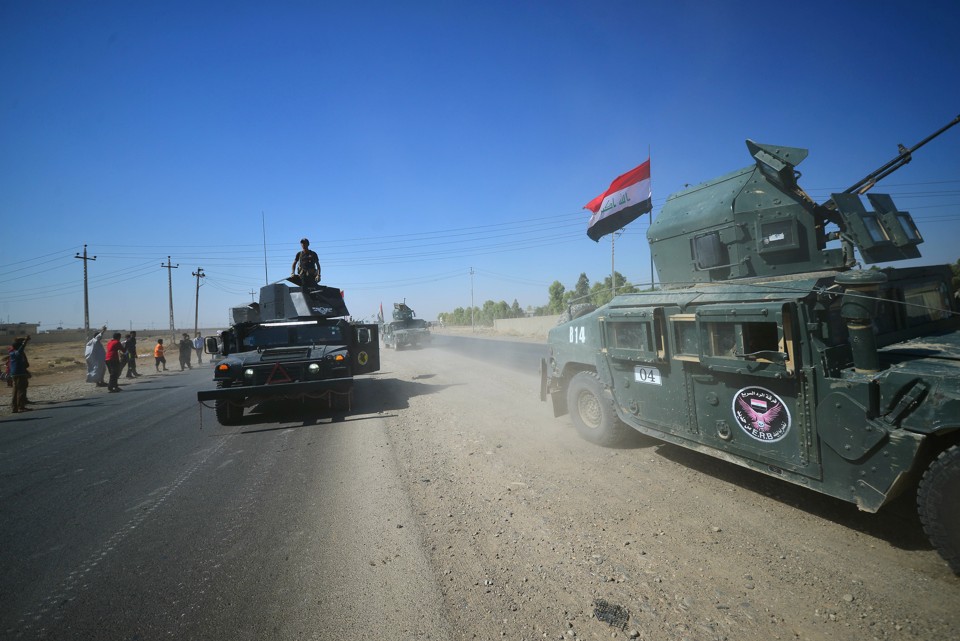Page added on October 21, 2017
Kirkuk crisis just beginning

Reports emerged Monday that ISIS had been defeated in Raqqa, the Syrian city it claims as its capital, signaling a major victory in the years-long battle against the militant group and the near end to its self-declared caliphate. But already there are signs the post-ISIS battles are only beginning: In neighboring Iraq, government forces have recaptured Kirkuk, an oil-rich province that has been under Kurdish control since 2014, after beginning to move on the disputed region over the weekend.
Iraqi government forces had retreated from Kirkuk in 2014 amid what seemed at the time to be ISIS’s unstoppable advance in northern Iraq. Kurdish forces known as the peshmerga quickly filled the void, taking control of the region that both the Kurdish government based in Erbil and the Iraqi national government based in Baghdad claim is rightfully theirs. (The Kurdistan Regional Government, or KRG, enjoys broad autonomy from Iraq and seeks an independent state.) That move angered not only Baghdad, but most of Iraq’s neighbors, who feared the Iraqi Kurds were setting the conditions to create a Kurdish state that would embolden Kurdish separatist forces in their own countries. But while the U.S.-led military effort in the region focused on uprooting ISIS from Iraq and Syria, longstanding regional rivals found ways to cooperate against their common enemy, setting aside major differences—until last month.
Ben Van Heuvelen, editor-in-chief of Iraq Oil Report, a publication focused on energy and security in Iraq, said in an interview that he believes the referendum pushed the Iraqi government to act. “Would this have happened had the referendum not been held?” he asked. “In my mind, the answer is just unequivocally that there’s no chance that this would have happened.”
Renad Mansour, a research fellow at Chatham House, the British think tank, told me he believed that, in particular, Kirkuk’s inclusion by the Kurdistan Regional Government within the borders of a hypothetical independent Kurdistan set the Kurds “on a very dangerous path.” Kirkuk accounts for about 12 percent of the total oil produced in Iraq, and its status is considered disputed between the Iraqi federal government and the Kurdistan Regional Government; under the 2005 constitution, which entity it joins was to be decided by referendum, though Kirkuk has not held one of its own to decide. The KRG made the decision for them. “It’s a huge gamble being played by the president of the Kurdistan region,” he said, referring to Masoud Barzani. “And this is the consequence of it.”
“Federal forces have achieved a large portion of their stated objective which is to reassert federal control over areas in which they were present before ISIS in 2014,” Van Heuvelen said.
They have Washington’s support, in theory. The U.S. position is that Iraqi federal forces should have a presence in all areas that are constitutionally defined as part of federally controlled Iraq, including Kirkuk. “The U.S. government has taken Baghdad’s side” on Kirkuk, Van Heuvelen said. (President Trump said Monday the U.S. wasn’t taking sides in the conflict.) “And to the extent that the U.S. is serving as a broker between the Baghdad government and Kurds, the party that it’s talking to is the Kurdish faction that is most conciliatory and most willing to compromise.”
It’s not just Arabs and Kurds facing off in Kirkuk; the dispute has also pit one Kurdish faction against another. The Patriotic Union of Kurdistan is one faction; it is allied with Iran and the U.S. and more open to reconciliation with Baghdad. Barzani’s Kurdistan Democratic Party (KDP), which organized the independence referendum and opposes Iraqi control of Kirkuk, is another. The PUK controls most of the city of Kirkuk, and as Iraqi forces drew closer to it, some peshmerga allied with the group withdrew from their positions. Areas where the Iraqi military was reported to be in firefights with peshmerga were reportedly controlled by KDP fighters.
Iran’s influence is worrying to the U.S. and its Sunni Arab allies in the region. The Islamic Republic supports Shia populations across the Middle East, most especially in Iraq, which is majority Shia. Mansour said the Kurds were an early and important U.S. ally in the Iraq war calculus because they ensured an anti-Iranian movement. “But what’s happened recently is the U.S. has decided that they want to play with [Iraqi Prime Minister] Haider al-Abadi instead—and that he is their number-one guy—because he presents himself as … being willing or wanting to minimize Iranian influence, as well as to build up the Iraqi state,” he said. With its major backer, the United States, now working closely with Iraq, the Kurds are faced with a familiar historical reality: They have few allies.
“The problem for the Kurds is that they need diplomacy,” Mansour said. “Without any sort of diplomatic lifeline, without any sort of ally, they can only lose. It’s a matter of their survival.”
The U.S., which wants to focus on ISIS until the group is fully defeated in the region, would like its allies in Iraq to work together against the militant group. The Kurds, after all, are also a key U.S. ally in the fight against ISIS in Syria. But as Van Heuvelen said: “As has happened so many times in U.S. policy in Iraq, the U.S. government has acted as a firefighter rather than a proactive mediator. And the crisis only got the serious attention it deserved after it was too chaotic to solve.”
The situation in Kirkuk could herald the start of even more chaos—despite the U.S. military’s claim the exchange of fire between Iraqi forces and Kurds was the result of a “misunderstanding.” As Van Heuvelen put it: “The precedent that has just been set is that these disputes are now being resolved through force—not politics.”
10 Comments on "Kirkuk crisis just beginning"


joe on Sat, 21st Oct 2017 8:08 am
Again, do we have to reeducate everyone?
PROJECT FOR THE NEW AMERICAN CENTURY.
The plan is being executed with dumb brutality. Afghanistan is still resisting and these dumbasses are still pressing on. At least using commie losers like the ypg and peshmerga will give an easy victory to Turkey and may lead to an expanded Turkey rather than a free kurdistan, the US is notoriously back-stabby when it wants. Where are those WMDs??? I think I might have saw some in Baghdadis shoes…….
http://www.informationclearinghouse.info/article1665.htm
http://www.informationclearinghouse.info/map-new-middle-east.jpg
Cloggie on Sat, 21st Oct 2017 9:01 am
PNAC is dead, multi-polar world a la Samuel Huntington is next.
I was wrong about ISIS and thought they were here to stay… because I didn’t foresee the brilliant last-minute Russian intervention, which tilted the balance in favor of Assad. But what a cliffhanger it was.
Now the Kurds are about to be slaughtered by almost everybody else. They made a big mistake in fighting ISIS too much, because in finishing off ISIS they paved the way for Baghdad, Damascus, Tehran and Ankara to finish off Kurdish independence moves.
And yet again, Washington has been betting on the wrong, that is losing horse.
Davy on Sat, 21st Oct 2017 9:39 am
Clog that has been over with for some time now. Get with the times. Good riddance to the failed neocons. Your Russian victory is just a tar pit of problems and challenges. Nobody wins in the Middle East. In a place where everyone hates everyone you never know who your friends are. Tell me this bright child who will be the one to pay for the rebuilding of Syria? This is a place that offers nothing in return. Not like they are sitting on much in the way of resources. You are crowing over a turd as usual.
GregT on Sat, 21st Oct 2017 10:01 am
A NAC might be dead, but the P is not.
Cloggie on Sat, 21st Oct 2017 10:10 am
Clog that has been over with for some time now.
I know, just lecturing joe.
Good riddance to the failed neocons.
They are still there, willing to bravely fight until the last American.
Your Russian victory is just a tar pit of problems and challenges.
I in contrast see it as just another blow against the NWO/PNAC/neocons.
Nobody wins in the Middle East.
Russian status greatly increased, American greatly decreased.
Tell me this bright child who will be the one to pay for the rebuilding of Syria?
EU, China, Russia and Iran, in that order.
Davy on Sat, 21st Oct 2017 10:16 am
Sure cloggie, you figure there are unlimited funds to do everything. You have so many future projects ahead I have lost count. This is a finite world of limits and every major power has its own issues of financial overextension. I know you think “pretend” money can be manufactured but it is more complicated than that.
Sissyfuss on Sat, 21st Oct 2017 10:23 am
A war for oil layered over with many forms of religious hatred and ethnic animosity is very difficult to explain with rational thought processes. Better to let monkeys pound on typewriters for a hundred years to come up with an accurate description.
Cloggie on Sun, 22nd Oct 2017 2:13 am
In a few days time the Kurds lost half of their territory within Iraq. What was build-up in 14 years post-Saddam was lost in no-time. Iraqi troops are now 50 km away from capital Arbil. The question is will Baghdad press on and retake Arbil and the rest of Iraqi Kurdistan and abandon Kurdish autonomy. Turkey would love it.
http://www.spiegel.de/politik/ausland/kirkuk-schwarze-woche-fuer-die-kurden-des-irak-a-1173939.html
Cloggie on Sun, 22nd Oct 2017 2:16 am
A war for oil layered over with many forms of religious hatred and ethnic animosity is very difficult to explain with rational thought processes. Better to let monkeys pound on typewriters for a hundred years to come up with an accurate description.
You have great trouble understanding the basic condition of life on this planet: one giant struggle to stay alive. This applies to plants, animals and humans. Why don’t you start a vegetable garden to observe this struggle first-hand.
Boat on Sun, 22nd Oct 2017 2:09 pm
What’s weird is the pipelines are still flowing. Negotiations must still be going on.